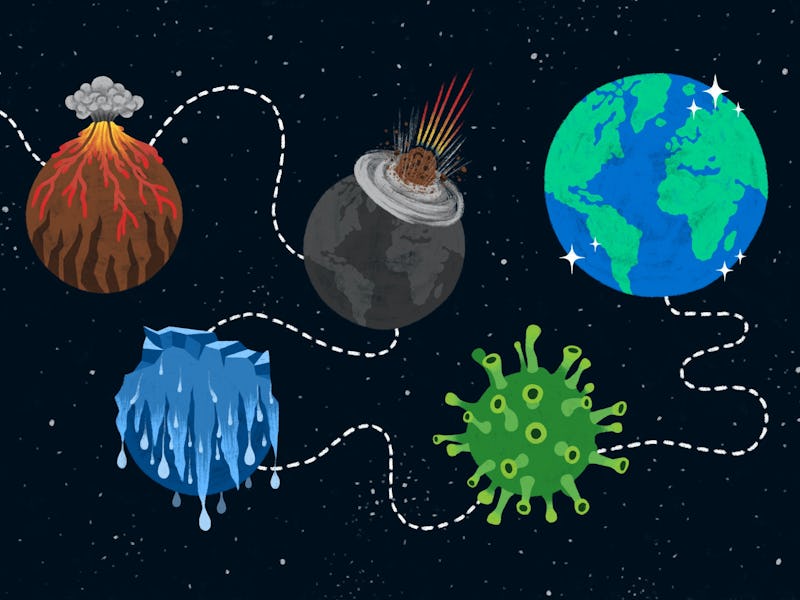5 stories that investigate the next 100 years on Earth
Our 2021 Earth Day issue reports on the next 99 years.

The one question Inverse attempts to answer with its reporting is “what’s next?”
For Earth Day this year, we are taking the extremely long view with a series of articles that explore different scenarios regarding the Earth 100 years from now, in the year 2121.
This miniseries is part of a special issue we’ll be adding to all week long, so be sure to check Inverse Daily each morning for the latest links about the future of Earth.
I’m Nick Lucchesi, editor-in-chief at Inverse. I’m glad you’re here.
This is an adapted version of the Inverse Daily newsletter for April 20, 2021. Subscribe for free and earn rewards for reading every day in your inbox.
Earth, 2121 — We asked reporter Maddie Bender to examine a few doomsday scenarios and one perfect scenario as they relate to the health of the planet. Bender interviewed scientists and researchers, experts in their field, asking them to play along as we tried to pair fact with the sort of fantasy you might watch one-hour documentaries about on the History Channel.
The result is a quintet of vignettes that we hope get your brain juices flowing. Dive into these planetary plotlines, no matter how far-fetched some might be. (We, too, enjoy the History Channel, after all.)
5. What would happen if a supervolcano erupted? — “If a volcano wants to erupt, it's going to erupt,” volcanologist-turned-science journalist Robin George Andrews tells Inverse. “It would cause agricultural problems, ash would clog up car engines, knock out power lines, pollute waterways.”
4. What would happen if a pandemic killed 10 percent of humans? — “You would see cascading impacts throughout industrial civilization.”
3. What would happen if the polar ice caps melted? — “The number of people that would be affected by this is about 40 percent of the world population.
2. What would happen if a giant asteroid hit the earth? — “Within the first few hours after the impact, it really quickly turns the Earth into this horrible scorched hellscape.”
1. What happens if we solve climate change? — “It's very important that we take steps, and we take them rapidly.”
And below are more headlines from Inverse put together by our talented team of writers.
NASA’s Ingenuity Mars Helicopter took this shot, capturing its own shadow, while hovering over the Martian surface on April 19, 2021.
NASA: Mars helicopter brings us into “the third dimension” — NASA's Mars Ingenuity helicopter succeeded in its first test flight, setting the stage for a new way to explore other planets.
SpaceX Starship: Stunning new concept art reveals NASA's lunar lander — NASA has chosen SpaceX's ship, paired with the Starship, to land humans on the Moon for its Artemis program. It sets the stage for future Mars missions.
You need to watch the best sci-fi action movie of 1998 for free online ASAP — This underrated Paul W.S. Anderson sci-fi classic demands to be seen. Watch it while you can.
Quantum internet: A revolution in knowledge is almost a reality — Fully realized quantum internet is still a far-off goal, but a new three-node network brings it significantly closer.
Keep your gut bacteria happy by eating more of these five food groups — A new study finds diets high in processed, animal-based foods may correspond with an increase in dangerous, inflammatory gut bacteria.
Tesla Powerwall: Video shows a fairytale-like home powered by solar — An architect has spent the past decade tweaking his eco-friendly home of the future — and now he’s handing over more control to Tesla.
Does my cat love me? Science explains — Every cat owner knows feelings of feline rejection all too well. Three cat experts reveal how to tell if they even like you.
I don’t know a better place to end it for today than that one 👆.
That wraps up this Tuesday edition of Inverse Daily. I would like to thank you for reading so loyally! You can follow me on Twitter at @nicklucchesi, where I share some of my favorite stories from Inverse every day. We will see you tomorrow.